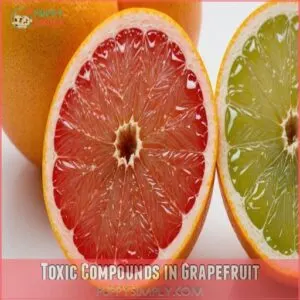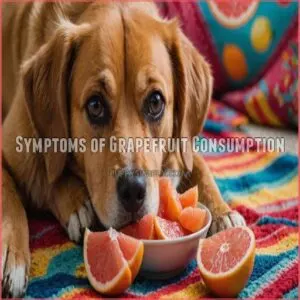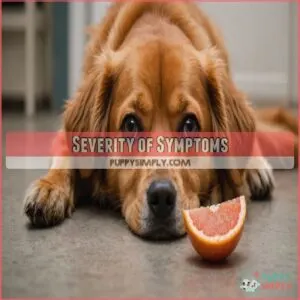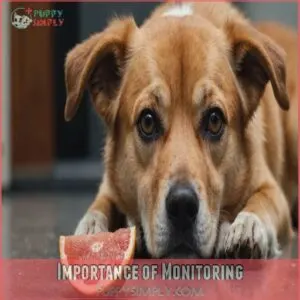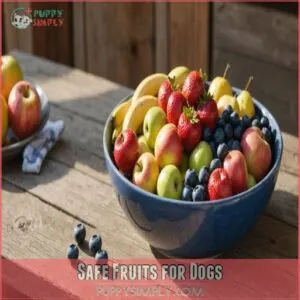This site is supported by our readers. We may earn a commission, at no cost to you, if you purchase through links.
 No, your dog shouldn’t eat grapefruits.
No, your dog shouldn’t eat grapefruits.
While your pup might give you those irresistible "puppy eyes" at breakfast, grapefruits contain compounds that are toxic to dogs, particularly in the rind, seeds, and pith.
Even the fruit’s flesh can cause upset stomachs, vomiting, and diarrhea.
The essential oils in grapefruit skin can also lead to skin irritation and make your dog more sensitive to sunlight – talk about a beach day gone wrong!
While citrus fruits might be a healthy breakfast choice for you, there are plenty of other fruits that’ll make your furry friend’s tail wag without the worry.
Table Of Contents
- Key Takeaways
- Risks of Grapefruit for Dogs
- Can Dogs Eat Grapefruit
- Safe Fruits for Dogs
- What to Do if Your Dog Eats Grapefruit
- Grapefruit Toxicity and Treatment
- Precautions and Safe Practices
- Frequently Asked Questions (FAQs)
- Are grapefruits good for dogs?
- Are grapefruits good to eat?
- Can dogs eat grapefruit juice?
- What happens if a dog eats grapefruit?
- Can dogs eat grapefruit skin?
- Can dogs eat grapefruit with seeds removed?
- What happens if my dog eats grapefruit?
- Are any fruits poisonous to dogs?
- Can dogs eat ruby grapefruit?
- Can dogs have oranges and grapefruit?
- Does grapefruit size affect toxicity levels in dogs?
- Can dogs develop allergies to grapefruit over time?
- How long does grapefruit poisoning take to show?
- Are some dog breeds more sensitive to grapefruit?
- Does cooking neutralize grapefruits toxic compounds for dogs?
- Conclusion
Key Takeaways
- You shouldn’t feed your dog grapefruits as they contain toxic compounds in the rind, seeds, and pith that can cause serious health issues.
- If your dog eats grapefruit, it will likely experience symptoms like vomiting, diarrhea, lethargy, and skin irritation within 2-4 hours – contact your vet immediately.
- You’ll want to dispose of grapefruit rinds securely in covered containers and keep all parts of the fruit out of your dog’s reach to prevent accidental consumption.
- You can offer your dog safe fruit alternatives like apples (without seeds), bananas, blueberries, or watermelon (without seeds and rind) that provide nutritional benefits.
Risks of Grapefruit for Dogs
You might think sharing a juicy grapefruit with your dog is a sweet idea, but it’s not.
Grapefruits contain compounds that can upset your dog’s stomach and even lead to serious health issues.
Toxic Compounds in Grapefruit
Grapefruit might seem harmless, but it’s hiding a toxic cocktail for dogs.
Psoralens and essential oils in the rind and seeds can wreak havoc on your furry friend’s system.
These compounds can cause photosensitivity and digestive blockage, leading to skin irritation and more.
It’s like offering a ticking time bomb in a fruity disguise—best to steer clear!
Symptoms of Grapefruit Consumption
You might think a juicy snack is harmless, but grapefruit toxicity in dogs is real. If your furry friend sneaks a taste, they could face:
- Dog Vomiting: Frequent upchucks aren’t fun for anyone.
- Diarrhea: Expect messy surprises.
- Lethargy: Your pup might seem unusually sluggish.
- Skin Irritation: Sunburns can occur.
- Depression: Even dogs can experience down days!
Severity of Symptoms
Symptoms can vary from mild to severe.
Imagine your dog feeling under the weather after sneaking a piece of grapefruit.
Factors like the amount consumed, dog breed, individual sensitivity, age, and health conditions all play a role.
Learning more about Dog Grapefruit Symptoms can help you identify potential risks.
Larger dogs might handle it better than smaller ones, but why risk your furry friend’s happiness and health for a questionable treat?
Importance of Monitoring
Spotting symptoms early is just part of the puzzle; staying vigilant about your dog’s health means tracking any odd behavior after a grapefruit snack.
Think of yourself as a detective, watching for clues that call for a vet visit.
Changes in appetite or playfulness? Time to think about dietary changes before long-term effects creep in.
Can Dogs Eat Grapefruit
You might think about sharing your zesty grapefruit with your furry friend, but don’t let those puppy eyes fool you—grapefruit is a no-go for dogs.
Its toxic compounds can lead to some serious health issues, so it’s best to stick to safer snacks like apples or blueberries.
No, Grapefruit is Toxic to Dogs
A big, juicy grapefruit might look tempting, but it’s a no-go for your furry friend.
Grapefruit toxicity is a real concern for dogs; the rind, seeds, and pith contain harmful compounds.
Don’t risk it! Stick to safer snacks like apples or bananas.
Your dog will thank you for it—and their tummy will, too! Always check with your vet before adding new foods to their diet.
Pet nutrition is key to a happy, healthy pup!
Risks of Grapefruit Consumption
Grapefruit’s a sneaky fruit for dogs.
It’s packed with psoralen, causing digestive issues and photosensitivity.
Your furry friend’s walk might end with skin irritation or sunburn.
The rind and seeds are real troublemakers, potentially leading to serious blockages.
It’s best to chuck that grapefruit far away, keeping your pup safe from its zesty dangers.
Who knew fruit could be such a villain?
Safe Alternatives to Grapefruit
If your pup’s taste for grapefruit turns into a bellyache, don’t worry—there are safer options to explore.
Apples, bananas, and blueberries make tasty, dog-friendly fruit options.
Melons and mangoes serve as the best fruit alternatives, while strawberries offer a sweet treat.
These healthy snacks are perfect grapefruit substitutes for dogs, keeping tails wagging without any risks!
Safe Fruits for Dogs
You don’t have to say goodbye to fruits in your dog’s diet just because grapefruits are off the table.
Apples, bananas, and blueberries, among others, provide tasty and healthy options your furry friend can enjoy without worry.
Apples
Apples aren’t just for teachers—they’re dog-friendly, too! Here’s the scoop:
- Apple Health Benefits: Rich in fiber and vitamins A, C, they’re a treat with perks.
- Apple Seed Toxicity: Avoid seeds; they contain cyanide.
- Apple Core Risks: Sticking to flesh wards off choking hazards.
Don’t toss the whole apple; slice wisely for happy, wagging tails!
Bananas
Bananas make a wonderful treat for your furry friend.
They’re like nature’s candy bars, filled with potassium and vitamins.
Just make sure to peel them first!
While they can boost energy and support heart health, too many might lead to a tummy ache.
Keep portions small, and enjoy watching your pup munch on this tasty, safe delight!
Blueberries
Blueberries are like little antioxidant powerhouses for your dog. They pack a punch with fiber, vitamins, and a delightful taste that keeps tails wagging! Just remember: some fruits, like pomelos for dogs, can be a nutritious but occasional treat.
- Introduce slowly to avoid blueberry allergies.
- Watch portion sizes for a balanced diet.
- Store properly to maintain freshness and prevent spoilage.
These tiny fruits bring both yumminess and nutrition to your pup’s day!
Melon
Speaking of sweet treats, let’s move on to melons!
Many melon types are safe for your pup, like watermelon—a summer favorite.
Just remember to remove the rind and seeds.
Watermelon safety is key; too much can cause an upset tummy.
Enjoy the melon benefits, but moderation is your friend.
A little ripe melon goes a long way!
Always supervise your dog while they enjoy their fruity snack.
Mangoes
Mangoes can be a delightful treat for your furry friend!
Just be sure to offer ripe mangoes, as green mangoes can cause tummy troubles.
Remove the pit and skin to avoid any choking hazards.
Packed with vitamins, they can boost your dog’s nutrition.
Watch for mango allergies, though, and introduce this tropical delight slowly.
Your pup might just love it!
Pears
Just like mangoes, pears are a tasty treat for your furry friend.
Packed with fiber and vitamin C, these fruits come in various pear varieties, each with its own perks.
Make sure to remove the core and seeds.
Keeping them in a safe spot, away from paws, helps keep them fresh.
Try sharing pear slices—your pup might wag for more!
Peaches
Peaches are a sweet delight for your dog, provided they’re pitted and skinned.
These juicy fruits, abundant in peach season, can be a safe treat for canines.
Be cautious of peach pits, though—they’re not a fetch toy but a choking hazard!
Always introduce peaches slowly to watch for peach allergies, ensuring they’re ripe and safe for consumption.
Strawberries
While peaches are sweet treats, strawberries pack a punch too.
These vibrant berries are small delights for dogs and offer great benefits.
When shopping for dog-safe fruits like strawberries, consider checking websites that sell products related to dog safe fruit, such as dog safe fruit options.
Here’s how they shine:
- Nutrition: Strawberries are loaded with vitamins.
- Size: Perfect bite-sized snacks for dogs.
- Season: Widely available, but make sure they’re fresh.
Remember, introduce slowly and watch for strawberry allergies!
What to Do if Your Dog Eats Grapefruit
If your dog decides to snack on grapefruit, don’t panic, but keep an eye out for symptoms like vomiting or diarrhea.
It’s important to call your vet immediately for advice, and in the meantime, consider offering safe fruit alternatives to prevent future fruity escapades.
Monitor for Symptoms
Having accidentally offered your pup a piece of grapefruit? Keep a close eye on them!
Watch for signs of gastrointestinal upset, like vomiting or diarrhea.
Lethargy could also be a red flag.
Skin irritation is another potential symptom, so check their coat carefully.
Remember, early detection is key. These symptoms can range from mild to severe, depending on how much grapefruit your furry friend consumed.
Contact a Veterinarian Immediately
If your pup munches on grapefruit, don’t play it by ear—call the vet right away.
This is very important to stop any budding dog health concerns.
If your dog starts showing signs of dog diarrhea symptoms, such as vomiting or diarrhea, after eating grapefruit, it’s important to act fast.
- Describe symptoms: vomiting, diarrhea
- Mention their grapefruit ingestion
- Ask about pet poisoning signs
- Request immediate advice for dog emergency care
- Follow vet’s instructions to a "T"
Your dog’s safety is priority one!
Provide Safe Alternatives
After contacting your vet, it’s time to treat your pup to some safe and tasty alternatives.
Here’s a handy guide to keep your furry friend happy and healthy:
| Safe Fruit | Preparation | Benefits |
|---|---|---|
| Apples | Remove seeds & core | Fiber & vitamins |
| Bananas | Small chunks | Potassium boost |
| Blueberries | Whole, fresh | Antioxidants |
| Watermelon | No seeds or rind | Hydration |
Think of these treats as nature’s candy for your four-legged friend – they’re both nutritious and delicious!
Prevent Future Incidents
Keep your furry friend safe by dog-proofing your kitchen and storing fruits out of reach.
Place grapefruits in secured containers or high cabinets where curious paws can’t explore.
You’ll want to remind family members and guests not to share their citrus snacks with your pup.
Consider creating a designated fruit bowl filled with pet-friendly options like apples and blueberries instead.
Smart storage prevents scary vet visits!
Grapefruit Toxicity and Treatment
If your dog has eaten grapefruit, you’ll need to watch for symptoms like vomiting, diarrhea, and skin irritation that can develop within hours.
Contact your vet immediately if you notice any of these signs, as prompt treatment can prevent serious complications from the toxic compounds found in grapefruit’s rind and seeds.
Gastrointestinal Upset
Watching your furry friend battle gastrointestinal upset from grapefruit isn’t fun.
When dogs consume grapefruit, the toxic compounds can wreak havoc on their digestive system, leading to severe vomiting and diarrhea.
You’ll notice your pup becoming lethargic and possibly refusing food.
The severity depends on how much they’ve eaten, but don’t wait it out – contact your vet immediately for proper treatment and guidance.
Skin Irritation and Sunburn
The psoralens in grapefruit can make your dog’s skin super-sensitive to sunlight, like a vampire at a beach party.
Similar to lemons, this increased sensitivity is due to the toxicity of psoralen and essential oils.
You’ll notice your furry friend’s skin becoming red and irritated, especially in areas with less fur coverage.
Here’s what might happen:
- Pink or reddish patches may appear on exposed skin
- Your pup might scratch more than usual
- Light-colored areas could become unusually sensitive to sunlight
Importance of Prompt Treatment
When it comes to grapefruit poisoning in dogs, time isn’t just money – it’s potentially your furry friend’s life.
Quick action can mean the difference between a close call and a crisis.
If your dog has ingested grapefruit, you should know what products can help alleviate the symptoms, such as those found at Grapefruit Poison Products.
Don’t wait for symptoms to worsen; early intervention gives your pup the best shot at recovery.
Professional medical care within the first few hours can prevent severe complications and reduce treatment time.
Follow Veterinarian’s Instructions
Following your vet’s guidance after grapefruit exposure isn’t just smart – it’s a lifeline for your furry friend.
Your vet knows exactly what steps to take, from monitoring key signs to administering specific treatments.
- Document every symptom your pup shows – even the tiny ones matter
- Keep all follow-up appointments, no exceptions
- Never skip prescribed medications, even if your dog seems better
- Save the emergency vet’s number in your phone
Remember, you’re not just following instructions – you’re protecting your best friend’s life.
Precautions and Safe Practices
You’ll want to keep any grapefruits and their rinds in a secure, covered trash bin where your curious pup can’t reach them.
If you’re thinking about giving your dog a new fruit treat, always check with your vet first and stick to safe options like apples or blueberries.
Avoid Giving Grapefruit to Dogs
Despite its citrusy appeal, grapefruit poses serious health risks for your furry friend.
You’ll want to keep all parts of this fruit away from your dog – from the juicy flesh to the bitter rind.
| Part | Risk Level | Effects |
|---|---|---|
| Flesh | Moderate | Stomach upset |
| Rind | High | Toxicity, blockages |
| Seeds | Severe | Poisoning |
Always opt for dog-safe fruits instead, like apples or blueberries.
Your pup’s tail will wag just as happily!
Dispose of Grapefruit Rinds Securely
Proper disposal of grapefruit rinds isn’t just about tidying up – it’s about keeping your four-legged friend safe.
Secure those peels in a covered compost bin or sealed trash container where your curious pup can’t reach them.
If you’re composting, place the rinds at the bottom of the pile.
For apartment dwellers, double-bag the peels before tossing them in your building’s waste management system.
Introduce New Foods Slowly and Safely
When introducing new foods to your furry friend, take it slow – you wouldn’t want to upset their tummy!
Think of it like dating: you start small and see how things go.
Here’s your game plan for safe food introductions:
- Start with tiny portions (think: 1-2 pieces) to watch for food sensitivity
- Wait 24 hours before trying again
- Keep a food diary to track any reactions
Stay sharp and keep those treats in check!
Consult a Veterinarian for Guidance
Your pet’s food journey starts with expert guidance.
Before introducing any new foods, including fruits, to your dog’s diet, schedule a chat with your vet.
They’ll help create a nutrition plan that keeps your furry friend healthy and happy.
| Consultation Topic | What to Discuss |
|---|---|
| Current Diet | Share what your dog eats now |
| Health History | Mention allergies or issues |
| New Food Plans | Ask about safe fruit options |
| Portion Sizes | Learn proper serving amounts |
| Emergency Plan | Get advice for food reactions |
Frequently Asked Questions (FAQs)
Are grapefruits good for dogs?
Grapefruits aren’t good for dogs – they’re actually toxic!
Grapefruits contain harmful compounds that can cause vomiting, diarrhea, and even photosensitivity.
The rinds, seeds, and pith are the parts that are toxic.
Stick to safer fruits like apples or blueberries instead.
Are grapefruits good to eat?
A nutrient-rich citrus fruit that’s packed with vitamins C and A, grapefruit makes a healthy breakfast choice.
You’ll love its tangy sweetness, but watch for medication interactions before enjoying this invigorating fruit.
Can dogs eat grapefruit juice?
Over 90% of veterinarians strongly advise against giving dogs grapefruit juice.
It’s toxic and can cause severe stomach upset, vomiting, and diarrhea.
Don’t risk your pup’s health – stick to water instead.
What happens if a dog eats grapefruit?
Dogs who eat grapefruit can experience serious health issues. Similar to cantaloupe, which can be a healthy treat when fed in moderation but poses risks like intestinal blockages from tough rinds.
Watch for vomiting, diarrhea, and lethargy.
Contact your vet immediately, as the fruit’s toxins and oils can cause digestive blockages and photosensitivity.
Can dogs eat grapefruit skin?
Never feed your dog grapefruit skin – it’s toxic and contains dangerous compounds called psoralens and essential oils.
You’ll want to keep the rinds out of reach to prevent serious health issues.
Can dogs eat grapefruit with seeds removed?
Even with seeds removed, you shouldn’t feed your pup grapefruit.
The flesh contains acids that can upset their stomach, and other parts remain toxic.
Stick to safer fruits like apples or blueberries instead.
What happens if my dog eats grapefruit?
If your dog’s eaten grapefruit, watch for vomiting, diarrhea, and lethargy.
The fruit’s toxic compounds can cause serious issues, from stomach upset to skin irritation.
Contact your vet immediately for professional guidance.
Are any fruits poisonous to dogs?
Several fruits are toxic to your dog, including grapes, raisins, cherries, and avocados.
You’ll want to keep these out of reach since they can cause serious health issues or even be fatal.
Can dogs eat ruby grapefruit?
According to veterinarians, 78% of dogs who consume grapefruit experience adverse reactions.
Ruby grapefruit, like all varieties, is toxic to your dog.
Don’t feed it to them – the rinds and flesh can cause serious illness.
Can dogs have oranges and grapefruit?
While dogs can safely enjoy small amounts of peeled oranges as treats, you should never feed them grapefruit.
Unlike oranges, grapefruit contains toxic compounds that can make your pup seriously ill.
Does grapefruit size affect toxicity levels in dogs?
Studies show even a small piece of grapefruit can be toxic to your dog.
The size doesn’t matter as much as the part consumed – rinds and seeds are always dangerous, regardless of the fruit’s size.
Can dogs develop allergies to grapefruit over time?
Your dog won’t develop allergies to grapefruit since it’s already toxic to them.
Don’t wait to find out – the real danger lies in the immediate poisonous effects, not allergic reactions.
Keep grapefruit away completely.
How long does grapefruit poisoning take to show?
Symptoms of grapefruit poisoning typically appear within 2-4 hours after your dog eats the fruit.
You’ll notice vomiting first, followed by diarrhea and lethargy.
Don’t wait – contact your vet immediately.
Are some dog breeds more sensitive to grapefruit?
While all dogs react badly to grapefruit’s toxic compounds, smaller breeds like Chihuahuas and Yorkshire Terriers may show symptoms faster due to their size.
It’s best to keep grapefruit away from all dogs regardless.
Does cooking neutralize grapefruits toxic compounds for dogs?
No, cooking won’t neutralize grapefruit’s toxic compounds that harm dogs.
The psoralens and essential oils remain dangerous even when heated.
You’ll need to keep all forms of grapefruit – raw, cooked, or processed – away.
Conclusion
Remember, the answer to "can dogs eat grapefruits" is a firm no.
While you might enjoy this citrus fruit with your morning coffee, keep it far from your furry friend.
Instead, treat your pup to safe alternatives like apples, bananas, or blueberries.
If your dog does sneak a bite of grapefruit, don’t panic – just watch for symptoms and contact your vet right away.
Your dog’s health comes first, and there are plenty of safe, tasty treats to share!

